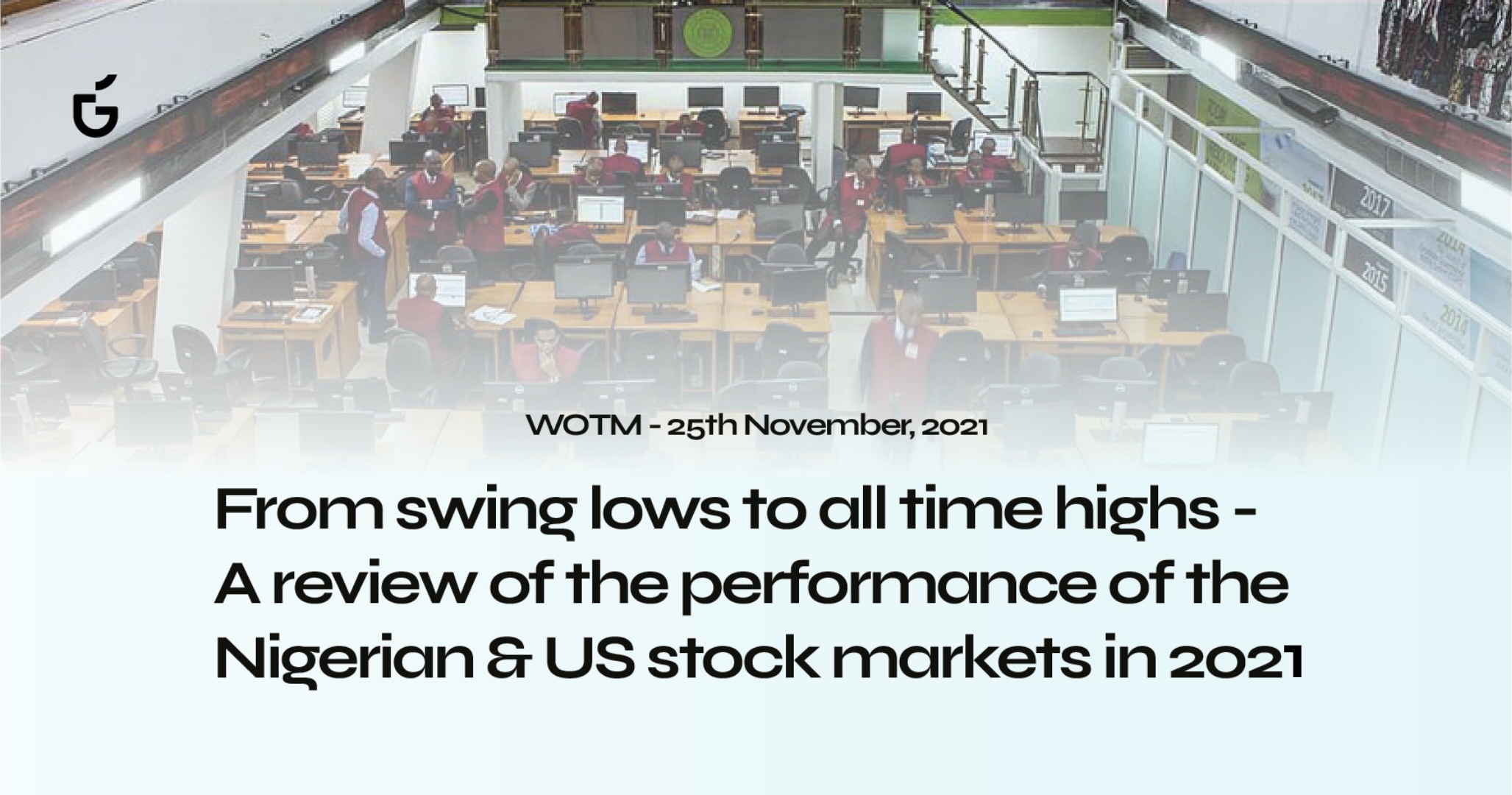 Africa
AfricaUnderstanding how companies are valued – A look into the MainOne acquisition
15 December, 2021
14 July, 2021 | 4 MINS READ
The Story
By the end of July 2021, the legislative arm of government of the United States of America (USA) will have to decide on raising or suspending the country’s current debt limits. Failure to reach a decision by the end of the month could see the USA for the first time in history, default on its loan obligations. Reaching a debt limit implies the country would not be able to raise new bonds and will have to draw on its limited reserves to fund expenditure and fulfill debt obligations.
In Nigeria, BudgIT (a civic tech non-profit organization) in a recent social media post noted Nigeria spent 97% of its revenue in 2020 servicing debts (Debt servicing is the cash required to cover repayment of interest & principal on a debt). According to BudgIT, the federal government’s recurrent expenditure (salaries and overheads) in 2020 was funded with loans and CBN support (Printing money?).
Why has Government Debt Grown Significantly in the Past Year?
One of the many economic implications of the pandemic is rising debt profiles. Countries around the world have had to borrow heavily in the past year to fund recurrent bills and keep their economies afloat. The United States of America (USA), since the beginning of the pandemic have supported its citizens with huge stimulus funds running up to $4.5trn. In other parts of the world, the story is the same, the pandemic shut down revenue sources for most governments and so government had to resort to borrowing.
What is a Debt Limit and Why is the US looking to Suspend or Raise it?
A debt limit or debt ceiling, as it is popularly known in the US, is the maximum amount the US government can borrow by issuing bonds. Once the government’s debt levels rise to the set limit, the Congress is expected to raise the limit, or the US Treasury will have to seek other means of funding the government till the limit is raised. Should there be a failure to raise or suspend the debt ceiling, the US government will depend on its emergency funds to fund expenditure and debt obligation. Once the emergency funds are exhausted, the government reaches a “drop dead date” in which it can no longer meet debt obligations and will default on loan obligations. Though the US government has never defaulted on its loans, history shows that getting close to defaults can lead to a credit rating downgrade and distort financial markets. Given its position in the world, the US getting close to a default, poses systemic risk to the world economy.
Back in 1995/1996, the Clinton administration was forced to partially shut down government operations as the congress could not agree on raising the debt ceiling. The Republican party wanted a cut in government spending before it would approve on raising the ceiling on government debts. History repeated itself in 2011, when the Obama administration came within a few hours of defaulting on its debt obligations as the congress again wanted a cut in already appropriated spending before it could agree to raising the ceiling. The 2011 debt ceiling issue was particularly delicate as the US economy was just recovering from the 2008/2009 financial crisis and the congress’s hesitation in raising the debt ceiling put a dent to the fragile economic recovery recorded at the time and put the world economy at risk.
Fast forward to 2021, the situation is similar. The US government, coming out of a pandemic, has significantly raised spending to boost economic recovery. Besides the $1.9trn spent earlier in the year on fiscal stimulus, the Biden-led administration is again looking to pass a $2trn infrastructure bill into law. Debt levels in the US is now at $28.5trn which is a little higher than the debt ceiling of $28trn.
Bringing it Home, Nigeria’s Debt Profile
In October 2019, President Buhari presented the 2020 budget to the national assembly. The proposed budget for the year was N10.59trn with a revenue projection of N8.41trn. The budget was later cut down to N10.27trn after the pandemic hit in 2020 with a revenue projection of N5.08trn as crude oil prices dipped. The country’s debt as at the first quarter of 2020 was N29trn, 35% of this was external debt while 65% was domestic debt.
The dip in crude oil prices brought with it the scarcity of foreign exchange and lower government revenue in Nigeria. This automatically made the servicing of foreign debts more expensive. According to BudgIT, the country’s total revenue was N3.42trn, 97% of this went to debt servicing. This implies that for every N100 the government earned in 2020, N97 went into debt servicing.
The country’s total expenditure in 2020 was N10.01trn, meaning there was a deficit of N6.59trn. According to data from the Debt Management Office (DMO), total debt in 2020, grew by N5.5trn from N27.4trn at the end of 2019 to N32.9trn at the end of 2020. This leaves N1.09trn unaccounted for. TGIC research believes the N1.09trn may have come from the Central Bank of Nigeria (CBN) which has been a major source of government spending.
Expectations are that debt servicing will be better in 2021 than they were in 2020 based on higher revenue projections. Government revenue for 2021 has been projected to be N7.99trn, 37% higher than the N5.84trn projected in 2020. With this revenue, debt servicing is expected to be 41.6% of total expenditure in 2021. The reality, however, is that government revenue in 2021 will be lower than projected, lower oil production and a huge subsidy bill limits the revenue growth in 2021. This tells us debt servicing as a ratio of government expenditure will be higher. In Q1 2021, the government spent N1.02trn in debt servicing, this amount is 36% higher than the amount spent in Q1 2020.
The budget for 2021 fiscal year is N13.6trn, N5.6trn was projected as deficit. The government has submitted a supplementary budget of N896bn to the National Assembly. Last week, this budget was increased by the National Assembly to N983bn. The government intends to fund 74% of this supplementary budget with debt, some of which will be external. Besides the supplementary budget, the National Assembly approved the Federal Government’s request to raise N2.343trn ($6.183bn) of the expected N5.6trn deficit in 2021 budget from external borrowings.
Compared to other countries, Nigeria’s debt to GDP is low. But this does not give a true picture of the problem with Nigeria’s debt portfolio. Nigeria is piling debt it has no means of repaying, the government is not focused on growing revenue to fund expenditure but seems to believe that racking up debts is the easy way out. Borrowing to fund expenses that will not generate the income required to pay back the debt is preparing the country for a financial crisis. Should the country continue in this stride, its credit rating will be downgraded, and it will become more difficult and expensive to borrow as creditors will charge a premium for lending.
How Does this Affect Me as an Investor?
The debt ceiling in the US will be raised, but should the congress linger in announcing the increase of the debt ceiling, we might see a little shake up in financial markets like we saw in 2011. When the Congress took its time in raising the debt ceiling in 2011, the US economy had its credit rating downgraded and what we now know as Black Monday (Black Monday was the first trading day after the S&P gave the US a credit downgrade for the first time in history, financial markets reacted to this with a sell frenzy) in financial markets followed.
These kind of reactions in financial markets are usually temporary. However, should this happen, investors should be ready to take advantage of the short-term sell offs.
For investors in Nigeria, the government’s plans to increase its borrowings implies there will be an increase in rates on government securities (Savings Bond, Eurobonds, Treasury Bills, FGN Bonds) to attract investors. We however worry about the government’s ability to repay its foreign debt obligations given the foreign exchange situation in the country, the outlook on oil prices and the upcoming elections.
Basically, sit tight as we watch the drama unfold!
 Africa
Africa15 December, 2021
 Africa
Africa09 December, 2021
Join the biggest
investment club in Nigeria.